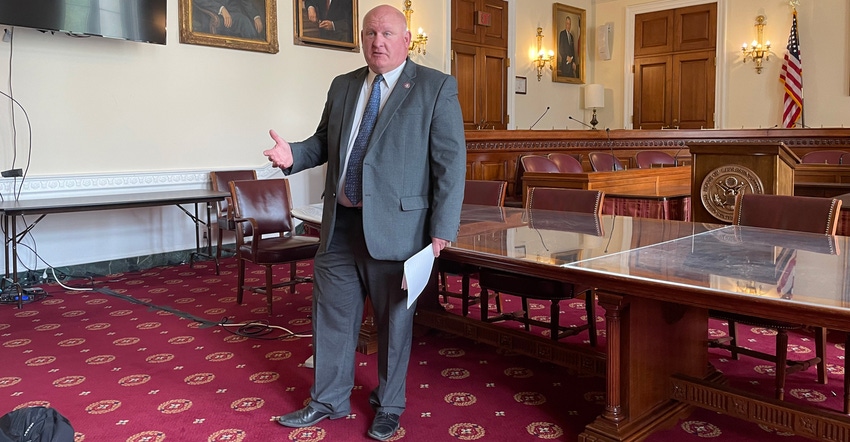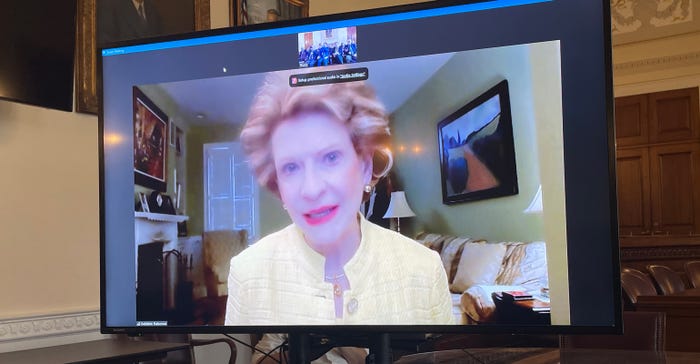
With hearings on the next farm bill just getting started, lawmakers are hearing from voters on what they want to see in the next package that will steer farm and nutritional policy and programs for the next five years.
Michigan Sen. Debbie Stabenow, chairwoman of the Senate Committee on Agriculture, Nutrition and Forestry — along with ranking member John Boozman of Arkansas — held her first hearing on the farm bill Friday at Michigan State University in East Lansing.
But unlike past farm bills, this farm bill will be drafted with a shroud of uncertainty in agriculture and other challenges that haven’t been seen in quite some time, Stabenow told a group of ag reporters gathered in the Longworth House Office Building in Washington, D.C.
“We have a series of new challenges in front of us. … We’ve seen what’s happened with the pandemic in terms of global supply chains that we’re now facing and the cost of food, and the consolidation, lack of competition, particularly in beef,” she said. “Coupled with climate crises that are hitting growers hard, and now what’s happening in the war in Ukraine, we have a number of risks for our farmers.”
Stabenow said she supports more ways for farmers and ranchers to take advantage of conservation programs that will benefit them and the environment, including the continued development of a voluntary carbon trading market. She also said that protecting crop insurance and expanding crop insurance, if possible, are priorities.
On recent news regarding Waters of the U.S. — it is currently in front of the Supreme Court — Stabenow said there is no legislative fix to WOTUS in the works right now as Senate leaders are waiting to see if the Biden administration will put something forward first.
She said that protecting water is a big deal in Michigan, but any legislative fix to WOTUS must be done in a way that ensures farmers have certainty that what they do won’t run afoul of federal regulations.
“There is no specific legislation right now, but whatever is done has to be in a way that works for our farmers, but at the same time, in addition to that, protecting waters is crucial,” Stabenow said.

GEARING UP: Sen. Debbie Stabenow of Michigan, chairwoman of the Senate committee on Agriculture, Nutrition and Forestry, held her first farm bill hearing in East Lansing, Mich. She said this next farm bill will be drafted with unique challenges facing the industry.
On the other side of the Capitol, Rep. Glenn “GT” Thompson, the ranking member of the House Ag Committee from Pennsylvania, said he was disappointed at the pace of farm bill hearings and negotiations thus far.
“We’re just way behind, which is frustrating to me,” he said.
He pointed to the 2018 Farm Bill in which there were 130 listening sessions and hearings by the time that bill was passed and signed by former President Donald Trump.
Oversight hearings on the 2023 Farm Bill started in February, Thompson said, but he thinks they should have started last year. “The key thing is we have started,” he said. “We’re only going to get this next farm bill right if we bring people to the table, if we bring the voices of ag from every state, all across the country, to the table.”
On specific programs, Thompson said he expects “good debate” on the farm bill’s commodity title and further changes to programs within that title. On the idea of permanent disaster assistance, Thompson said lawmakers need to learn from existing programs and what’s been done thus far. But he also said that any permanent disaster program should not impede on crop insurance and the ability of producers to choose their safety net.
“Because the moment you do that, that safety net will collapse,” he said. “And so we always should need to protect our safety net programs whether it’s crop insurance, whether it’s livestock margin, whether it’s dairy margin coverage.”
Inflation, Thompson said, is the biggest thing that he is hearing is affecting farmers, along with a sense of uncertainty over supply chain issues and new concerns over WOTUS.
On Ukraine, he thinks it will be disastrous for global food supplies as Ukraine, the breadbasket of many other nations, will have trouble getting any crops in the ground this month.
“We’re looking at a devastating fall in parts of the world,” he said. “In the U.S., it will be high prices and inflation, and possibly a lot more people coming across [the border] who want food.”
On the Growing Climate Solutions Act that recently passed the Senate, Thompson said he is opposed to the bill in its current form, preferring that lawmakers should have held more hearings and a markup process to make revisions. He thinks the bill, which among other things sets up a third-party carbon certification process at USDA, benefits mostly third parties and people inside the beltway, and leaves farmers, ranchers and foresters behind.
Market transparency, particularly in cattle markets, is also a big issue as evidenced by recent hearings held in Congress on the subject. Thompson said that he thinks the solution is to encourage growth and more competition in the cattle market, and that the Biden administration and others have unfairly blasted the four largest meat packers largely for political gain.
Thompson said he supports growing the number of processors across the country, which he thinks would go a long way toward solving competition issues.
About the Author(s)
You May Also Like






